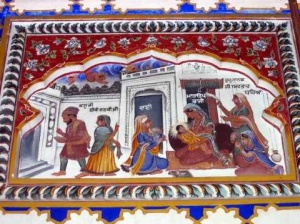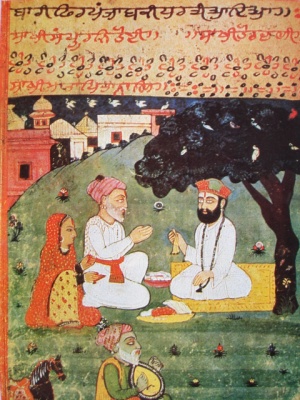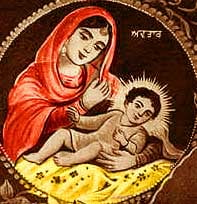Mata Tripta
Mata Tripta was Guru Nanak's mother. The history of Sikh women has to start with her. She was the person who brought Guru Nanak, the founder of the Sikh religion into the world.
In the annals of world history, the greatness of Mata Tripta, deserves to be celebrated for bringing to the world a soul who offered much spiritual and moral guidance and a solid and creditable foundation for a new world religion.
Mata Tripta and her husband Mehta Kalu lived in Talwandi, Punjab, which is now part of Pakistan. Weary saints and 'fakirs' would take rest here, and Mata Tripta would welcomed and serve all these passers-by.
Their dedication for service of others was finally rewarded when Nanak was born in 1469. Thus, Mata Tripta was blessed with the honour of giving birth to God's messenger, Guru Nanak, whose mission was to redeem mankind.
Why has she not been recognised?
No poet has ever been able to convey the ethereal beauty attained by Mata Tripta when she was expecting Nanak. Of the many prophets that have visited the earth, many of their mothers were unable to celebrate in the joy of rearing such wondrous offspring. For example; in Hinduism, Mata Devaki, the mother of Krishan Ji, was unable to fulfil her maternal role as she languished in jail. She yearned for her child, and he too missed the love of his mother.
In Christianity, Mary, the mother of Jesus, endured disbelief and prejudice, as a result of the 'immaculate conception' and 'virgin birth' of Jesus. Buddha's mother died on the day of his birth, and he was reared by his mother's sister. Trishula, the mother of Mahavir, was constantly tormented by nightmares before his birth.
In contrast to all of these examples, Mata Tripta was happy and peaceful throughout her pregnancy, meditating constantly on God's name. No other mother can have been more fortunate than her, in rearing the saviour Nanak so peacefully. Guru Nanak was born on the third day of the month of Vaisakh, Saturday April 15, 1469. A midwife assisted mother Tripta on the occasion. Her name was Daulatan. On giving birth to Nanak, she was blessed with all the joys of motherhood as she raised him and cherished him. MacAuliffe narrates in the tradition of the Janamsakhis that the midwife, when interrogated the following morning by Hardial, the astrologer, as to nature of the child’s voice uttered at birth, said it was "as the laughing voice of a wise man when joining a social circle."
Kind, responsible and loving mother
Mata Tripta was a kind lady. The young Nanak had a sociable nature, and, therefore, had many friends. He liked to treat them often. We know from the oral history tradition that Mata Tripta would sometimes slip him a coin or two to spend on his friends. She also often made sweets for him to share with his friends. She loved her son dearly, but his rejection of tradition and custom was a source of constant aggravation for her husband, Mehta Kalu.
On the occasion when Guru Nanak undertook "Sacha Sauda" (i.e. the incident when his father gave him money to buy some bargains from the nearest town, but Nanak used that money instead to buy food for some starving sadhus' he met on the way), Mehta Kalu was furious, but Mata Tripta's heart melted as she could relate to her son's actions and realised the greatness of her son's deeds at such a young age.
Bold and inquisitive son
Her son, Nanak, questioned the authority of the Brahmin priests, refused to wear the holy thread, and rejected the validity of the caste system. Mata Tripta did not understand the divine mission of her rebellious son. This is clear in the story of Nanak’s return from his first travel. His parents met him at the edge of town. Nanak was overcome with emotion, and was in tear when he met his mother. She offered him sweets and asked him to remove the beggar’s gown and put on the clothes she brought him. She showed much love and care for her son and wanted him to be seen in the best light in front of friends and neighbours in the village.
When Nanak got married and his wife Bibi Sulakhni came to their home, Mata Tripta was thrilled and overjoyed. Soon her happiness knew no bounds when she became a grandmother with the birth of Sri Chand, Guru Nanak's first son. She distributed sweetmeats throughout the village, and on the birth of her second grandson, Lakhmi Das, she could barely contain her excitement.
A responsible Grandmother
Soon, her son Guru Nanak would undertake his many travels and although she had her grandsons, she desperately missed her beloved son. However, she was selfless and always comforted and guided Bibi Sulakhni. On the same occasion his parents were much distressed. They believed that his travels and the rejection of present conventions were a sign of great unhappiness. His father, Kalu, was greatly disturbed when he exclaimed; "Only if I knew what has disappointed you in life, I would set things right. If you want to marry another woman, I’d get you one, if another house, I’d provide you with it." The behaviour of Nanak was not understood by his parents. His parents, who were well-to-do and respected in their community, were greatly perturbed, because they did not understand why he would not conform to social customs of the day.
According to the Bala Sakhis, Guru Nanak was very fond of his maternal grandmother. They were very close. Her name was Mata Bhirai, she was married to Rama of the village Chahal near Lahore. She was likely a frequent visitor to the home of Mata Banarasi, his paternal grandmother. In the prevalent custom of a joint family system, a woman always went to live in her husband’s family household, and because it was the custom for the grandparents to raise the children, one can assume that he would have been brought up by Mata Banarasi, his paternal grandmother. She was the mother of two sons, Kalu and Lalu, and wife of Shiv Ram, resident of Talvandi Rai Bhoi Ki, now called Nankana Sahib.
Exceptional mother with values
Much of what we know about the women of that era, has to be conjecture. One must look at what is known about socio-political, as well as the economic situation of the era, before one can even begin to guess what life must have been like for any given woman. The oral history or Janamsakhis give clues to events, but cannot be taken too seriously, in that they are coloured by the tellers’ own perception and background. As with any oral history, the story changes with time.
Each story-teller tries to put his personal stamp on the story, as well as embellishment, so that it is always told better than the time it was told before. We do know that at that time in Hindu society, woman, at least in theory, controlled the family finances. In fact, they probably controlled only the portion of income that dealt with the personal household; i.e., the groceries and small household items. In a joint family system, even that would be limited to the "mother-in-law" and not to all the women. Also, it would be subject to the whims of the man of the house. Nevertheless, this was the situation at the time of the birth of the first Guru.
On one of Guru Nanak's return from his travels to Talwandi, Mata Tripta knew her end was nigh so she implored him to stay. As Guru Nanak touched her feet to receive her blessings, she pulled him instead into one last loving embrace. It was in 1522 that she left this earth. Guru Nanak performed her last rites himself, and instructed everyone that there was no need for any rituals to be performed and everyone should meditate on God's name instead and accept his will (Hukam), as meditation and prayer is the only solace and reward for this life.
See also
External Links
- Bibi Gurdev Kaur
- allaboutsikhs.com
- tapoban.org Photos
- info-sikh.com Photos
- sikh-heritage.co.uk Photos
| Relatives of Shri Guru Nanak Dev guru nanak |
|
Grandparents: ✝ Mata Banarasi ✝ Baba Shiv Ram ✝ Grandparents (Maternal):✝ Mata Bhirai ✝ Baba Rama |



